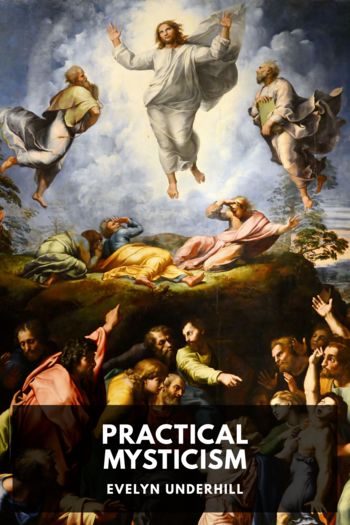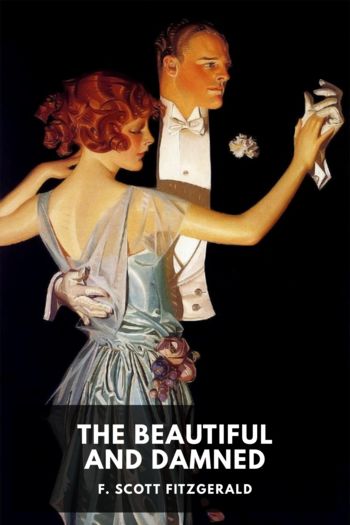Practical Mysticism by Evelyn Underhill (classic reads .txt) 📕

- Author: Evelyn Underhill
Book online «Practical Mysticism by Evelyn Underhill (classic reads .txt) 📕». Author Evelyn Underhill
The education of the mystical sense begins in self-simplification. The feeling, willing, seeing self is to move from the various and the analytic to the simple and the synthetic: a sentence which may cause hard breathing and mopping of the brows on the part of the practical man. Yet it is to you, practical man, reading these pages as you rush through the tube to the practical work of rearranging unimportant fragments of your universe, that this message so needed by your time—or rather, by your want of time—is addressed. To you, unconscious analyst, so busy reading the advertisements upon the carriage wall, that you hardly observe the stages of your unceasing flight: so anxiously acquisitive of the crumbs that you never lift your eyes to the loaf. The essence of mystical contemplation is summed in these two experiences—union with the flux of life, and union with the Whole in which all lesser realities are resumed—and these experiences are well within your reach. Though it is likely that the accusation will annoy you, you are already in fact a potential contemplative: for this act, as St. Thomas Aquinas taught, is proper to all men—is, indeed, the characteristic human activity.
More, it is probable that you are, or have been, an actual contemplative too. Has it never happened to you to lose yourself for a moment in a swift and satisfying experience for which you found no name? When the world took on a strangeness, and you rushed out to meet it, in a mood at once exultant and ashamed? Was there not an instant when you took the lady who now orders your dinner into your arms, and she suddenly interpreted to you the whole of the universe? a universe so great, charged with so terrible an intensity, that you have hardly dared to think of it since. Do you remember that horrid moment at the concert, when you became wholly unaware of your comfortable seven-and-sixpenny seat? Those were onsets of involuntary contemplation; sudden partings of the conceptual veil. Dare you call them the least significant, moments of your life? Did you not then, like the African saint, “thrill with love and dread,” though you were not provided with a label for that which you adored?
It will not help you to speak of these experiences as “mere emotion.” Mere emotion then inducted you into a world which you recognised as more valid—in the highest sense, more rational—than that in which you usually dwell: a world which had a wholeness, a meaning, which exceeded the sum of its parts. Mere emotion then brought you to your knees, made you at once proud and humble, showed you your place. It simplified and unified existence: it stripped off the little accidents and ornaments which perpetually deflect our vagrant attention, and gathered up the whole being of you into one state, which felt and knew a Reality that your intelligence could not comprehend. Such an emotion is the driving power of spirit, an august and ultimate thing: and this your innermost inhabitant felt it to be, whilst your eyes were open to the light.
Now that simplifying act, which is the preliminary of all mystical experience, that gathering of the scattered bits of personality into the one which is really you—into the “unity of your spirit,” as the mystics say—the great forces of love, beauty, wonder, grief, may do for you now and again. These lift you perforce from the consideration of the details to the contemplation of the All: turn you from the tidy world of image to the ineffable world of fact. But they are fleeting and ungovernable experiences, descending with dreadful violence on the soul. Are you willing that your participation in Reality shall depend wholly on these incalculable visitations: on the sudden wind and rain that wash your windows, and let in the vision of the landscape at your gates? You can, if you like, keep those windows clear. You can, if you choose to turn your attention that way, learn to look out of them. These are the two great phases in the education of every contemplative: and they are called in the language of the mystics the purification of the senses and the purification of the will.
Those who are so fortunate as to experience in one of its many forms the crisis which is called “conversion” are seized, as it seems to them, by some power stronger than themselves and turned perforce in the right direction. They find that this irresistible power has cleansed the windows of their homely coat of grime; and they look out, literally, upon a new Heaven and new Earth. The long quiet work of adjustment which others must undertake before any certitude rewards them is for these concentrated into one violent shattering and rearranging of the self, which can now begin its true career of correspondence with the Reality it has perceived. To persons of this type I do not address myself: but rather to the ordinary plodding scholar of life, who must reach the same goal by a more gradual road.
What is it that smears the windows of the senses? Thought, convention, self-interest. We throw a mist of thought between ourselves and the external world: and through this we discern, as in a glass darkly, that which we have arranged to see. We see it in the way in which our neighbours see it; sometimes through a pink veil, sometimes through a grey. Religion, indigestion, priggishness, or discontent may drape the panes. The prismatic colours of a fashionable school of art may stain them. Inevitably, too, we see the narrow world our windows show us, not “in itself,” but in relation to our own needs, moods, and preferences; which exercise a selective control upon those few aspects of the whole which penetrate to the field of consciousness and dictate the order in which we arrange them, for the universe of the natural man is strictly egocentric. We continue to name





Comments (0)